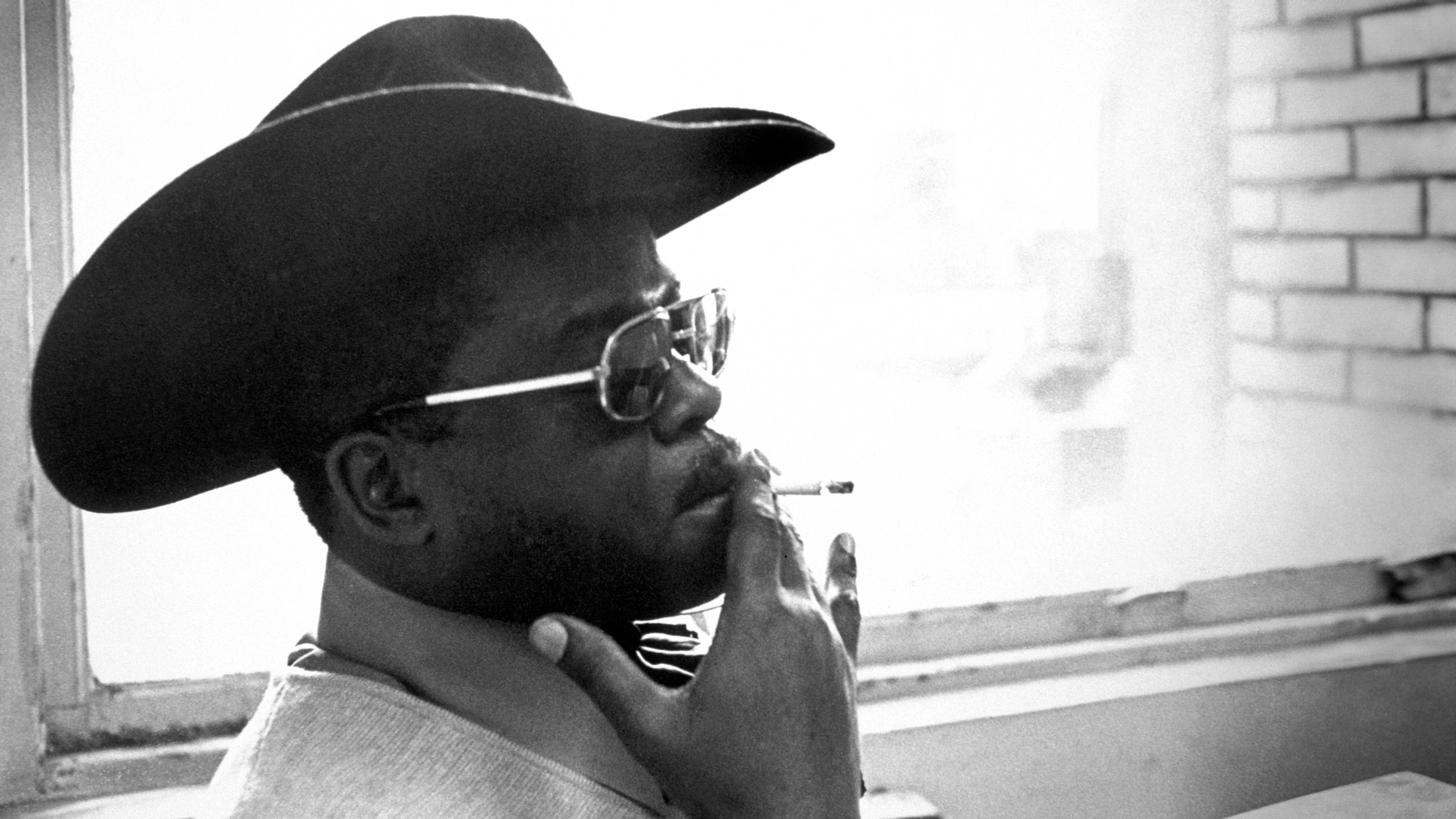“Elvis sorted through them, picking out several by title alone, then listening to them on the studio speaker… when he heard the second one, he instantly brightened. ‘Let me hear that again,’ he said. ‘Something I like about that one’..."
Otis Blackwell wrote over 1,000 R&B and rock ‘n’ roll hits, including some of Elvis's most iconic tracks, but "never wanted to meet him… We had something I felt that was going pretty good"

It’s a sad yet somewhat inevitable truth that great songwriters are almost destined to languish in obscurity compared to the A-list artists and producers who transform their compositions into hits. But even with such inequities in mind, Otis Blackwell’s profile is astonishingly low-key when you consider the raft of classic hits he penned over the years.
From 1955 onwards, Blackwell wrote over 1,000 R&B and rock ‘n’ roll hits, many of them classics. His first success came in 1956 with the sultry composition Fever, a No.1 R&B hit for Little Willie John, before Peggy Lee turned it into an international pop hit.
A co-write with fellow songwriter Jack Hammer yielded the storming 1957 classic Great Balls Of Fire for Jerry Lee Lewis, yet Blackwell is probably best known as the writer who penned hits such as Don’t Be Cruel (1956), All Shook Up (1957) and Return To Sender (1962) for Elvis Presley.
Blackwell’s compositions were absolutely pivotal to Presley’s success. These songs also cemented Blackwell’s reputation as a songwriter who helped redefine American pop music of the 1950s.
Otis Blackwell was born in Brooklyn, New York in 1931 and by the late-1940s he had begun writing songs while holding down a job as a pants presser in a tailor shop. Blackwell was a singer and by the early 50s was performing in various clubs and theatres in Brooklyn.
He recorded one of his songs, Daddy Rolling Stone, for producer and label executive Joe Davis. This became a minor R&B hit for Blackwell and was recorded years later by The Who.
In 1954, Blackwell decided to scale back his work as a performer and focus his talents exclusively on songwriting. But he did still provide the vocals for the demo versions of his songs that would be presented to publishers.
Want all the hottest music and gear news, reviews, deals, features and more, direct to your inbox? Sign up here.
In 1956, the vocal feel and strong hooks in his song Don’t Be Cruel caught the attention of song plugger Aaron ‘Goldie’ Goldmark of the Shalimar Music publishing company. Goldmark in turn passed it on to Freddy Bienstock, of music publishing company Hill and Range, who was responsible for soliciting and selecting songs for Elvis Presley’s early albums and films.
Like Goldmark, Bienstock saw the song’s potential, but he told Goldmark that if he wanted to get the song recorded by Elvis Presley, he would have to give up a third of the songwriting royalties to Elvis. Such deals have since provoked outrage but it wasn’t Elvis’s decision. The deal was actually brokered by his shrewd manager ‘Colonel’ Tom Parker.
But for songwriters, it was still an attractive deal, as the millions of record sales resulting from an Elvis Presley release would prove infinitely more lucrative than most other releases. “I was told that I would have to make a deal,” Blackwell says in Peter Guralnick’s acclaimed 1994 biography Last Train To Memphis: The Rise Of Elvis Presley. But as he noted in the magazine Jet in 1957: “I got a good deal. I made money. I’m happy.”
Presley recorded the song on 2 July, 1956, during an exhaustive session at RCA Victor Studios in New York. Elvis and his band – Scotty Moore on guitar, Bill Black on double bass and DJ Fontana on drums – were joined in the studio by the Jordanaires vocal quartet and piano player Shorty Long.
They had just finished eating a late lunch, when producer Steve Sholes began playing Freddy Bienstock’s acetate demos through the studio speakers. Don’t Be Cruel was the second song played.
“Elvis sorted through them,” wrote Peter Guralnick in Last Train To Memphis, “picking out several by title alone, then listening to them on the studio speaker as Steve broadcast them out from the control room. When he heard the second one, he instantly brightened. ‘Let me hear that again,’ he said. ‘Something I like about that one’... From the first moment Elvis heard ‘Don’t Be Cruel, he snapped on it. It was a perfect song for him.”
In Last Train To Memphis…, Guralnick explains how Elvis immediately began working it out on the guitar and then sketched out a rough arrangement for pianist Shorty Long. Presley told Scotty Moore to leave more space and asked DJ Fontana to “come in behind Scotty and slow it down a little”.
After twenty minutes the band were ready to record but Elvis wanted to keep rehearsing. In the height of the New York summer, the heat was stifling, as the air conditioning had to be turned off during recording to prevent extraneous noise.
That morning they had recorded Hound Dog, which took 31 takes. Don’t Be Cruel was almost as epic, with Elvis and the band recording 28 takes before settling on the final one.
“It took on a lilting, almost casual, offhand kind of feel,” wrote Guralnick, “as Scotty virtually sat out except at the beginning and the end, Gordon Stoker of the Jordanaires came to sing a duet with Elvis on the chorus, and DJ laid Elvis’s leather-covered guitar across his lap and played the back of it with a mallet, to get an additional snare effect… When they finally got the sound that he was looking for, Elvis pronounced, ‘That felt good’.”
In an interview on Late Night with David Letterman on 10 January, 1984 (below), Letterman asked Otis Blackwell whether it was true that Elvis imitated Blackwell’s vocal style from the demo on the finished recording. “Well they did come out very close to the demos I think,” replied Blackwell.
“And did you feel funny about him imitating so closely what you were putting on tape or not?” asked Letterman. “Well no, I felt a little funny the first time, then after he sold four million I [didn’t],” laughed Blackwell.
Don’t Be Cruel was released on 13 July 1956 and was backed by Hound Dog. Within weeks, Hound Dog had risen to No.2 in the pop charts with sales of over one million but it was soon overtaken by Don’t Be Cruel, which reached No. 1 on all three main charts: pop, country and R&B. Presley performed Don’t Be Cruel on all three of his Ed Sullivan Show appearances. By 1961 it had sold over six million copies.
Blackwell was asked to write more songs for Elvis and RCA set up a recording session in Hollywood in September 1956 to record new material for Presley’s second album and a new single. The song Blackwell submitted was Paralysed, but while it was included on the album, it wasn’t selected as the single.
Blackwell’s next submission was far more successful and it would be the last song on which he had to share songwriting credits with Elvis. “After Don't Be Cruel, Shalimar said I had a chance to get Presley again, so I wrote All Shook Up,” Blackwell told Time Barrier Magazine in July 1979.
“Al Stanton [music executive and producer] walked in one day with a bottle of Pepsi, shaking it, as they did at the time, and said, 'Otis, I've got an idea. Why don't you write a song called All Shook Up?’
“Two days later I brought the song in and said, 'Look, man, I did something with it'. After that song, the agreement about sharing songwriting credit was washed. We had both proved how good we were and had a good thing between the two of us.”
All Shook Up was recorded in January 1957 and released on 22 March 1957. The song shot to No.1 on the US Billboard Top 100 chart and stayed there for nine weeks. It also became Presley’s first No.1 hit in the UK, staying on the top slot for seven weeks.
In 1962, Freddy Beinstock approached Blackwell to co-write a single for Elvis’s upcoming film Girls! Girls! Girls! with songwriter Winfield Scott. The result was Return To Sender.
Thirteen songs were used in the film and all the songwriters were sent scripts, noting where a song was to be inserted and suggesting titles and genres for the songs. Blackwell and Scott reportedly ignored these notes, choosing instead to simply focus on writing a great song, regardless of whether it fitted into the film’s storyline.
Inspiration failed to strike until they received a demo of theirs, sent back to them by a record company with the words ‘Return To Sender! No such person! No Such Zone!’ stamped on it.
In his 2005 book Untold Gold: The Stories Behind Elvis’s No.1 Hits, writer Ace Collins explained how Blackwell and Scott decided to use those phrases as lyrics for a song about a failing relationship between “a spiteful woman and a heartbroken man”.
On 27 March 1952, Presley was tasked with recording all 13 tracks on the soundtrack of Girls! Girls! Girls! He was allegedly unenthusiastic about the material but became more energetic when he started recording Return To Sender.
Once again, he modelled his vocal style and inflections on Otis Blackwell’s vocal on the demo. Ace Collins noted that while watching Presley record the track, guitarist Scotty Moore and drummer DJ Fontana sensed that the “old magic” of Presley’s earlier work had returned.
In 1986, Otis Blackwell was inducted into the Nashville Songwriters Hall Of Fame and he moved to that city two years later. He lived in Nashville until his death from a heart attack in 2002,
In the course of his career, Otis Blackwell wrote over 1,000 songs, which were covered by artists such as Bob Dylan, Madonna, Dolly Parton, Kris Kristofferson, James Taylor, Debbie Harry and Ronnie Spector. But it is for the songs he wrote and co-wrote for Elvis Presley that he is probably best known.
Blackwell never met Elvis Presley and reportedly turned down an invitation from Colonel Tom Parker to appear in Girls! Girls! Girls!.
In his 1984 interview on Late Night with David Letterman, the host asked Blackwell if he was actually worried that physically meeting Presley would somehow “mess up the chemistry” of the working relationship. “Well you never know,” replied Blackwell.
“I never wanted to meet him… We had something I felt that was going pretty good. I thought as long as my songs were getting over to him and he was doing them the way that I would like for them to be done, in a sense we had met.”

Neil Crossley is a freelance writer and editor whose work has appeared in publications such as The Guardian, The Times, The Independent and the FT. Neil is also a singer-songwriter, fronts the band Furlined and was a member of International Blue, a ‘pop croon collaboration’ produced by Tony Visconti.


